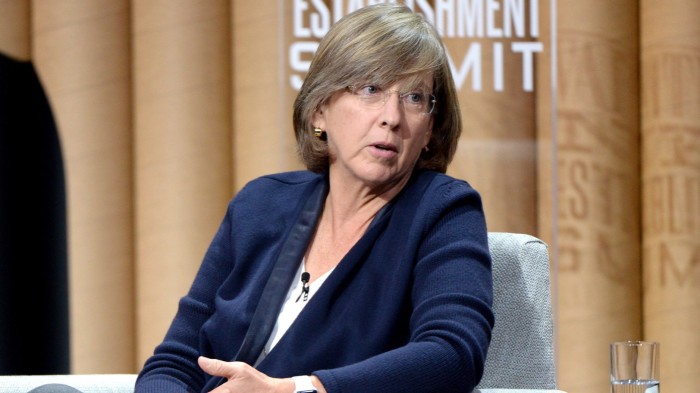Stay informed with free updates
Simply sign up to the Artificial intelligence myFT Digest — delivered directly to your inbox.
US groups such as OpenAI that are racing to develop artificial intelligence are at risk of being undercut by cheaper rivals such as China’s DeepSeek, according to star investor and analyst Mary Meeker whose presentations on tech trends are followed across Silicon Valley.
Meeker, an early backer of companies including Meta, Spotify and Airbnb, told the Financial Times that new AI advances will mint “multiple companies worth $10tn and they probably will not all be based in North America”.
She added “the wealth creation will be extraordinary. We have never had a five billion-user market that one could get to so easily.”
Her latest report on industry developments highlights the growing challenges for US groups that have taken an early lead in developing large language models (LLMs).
Meeker argues that the costs to train models such as OpenAI’s GPT series or Google’s Gemini is rising, while increasing competition from cheaper domestic models and overseas groups such as DeepSeek is putting pressure on pricing power.
“The business model is in flux. And there are new questions about the one-size-fits-all LLM approach, with smaller, cheaper models trained for custom-use cases now emerging,” according to the report. “In the short term, it’s hard to ignore that the economics of general-purpose LLMs look like commodity businesses with venture-scale burn.”
Meeker was dubbed “the queen of the internet” as a result of her analysis while working at Morgan Stanley, which anticipated the success of Google, Apple and others. She joined venture capital firm Kleiner Perkins in 2010, before co-founding her own investment firm, Bond, in 2019.
Her firm’s latest presentation illustrates how explosively the market for generative AI tools has taken off since the launch of OpenAI’s ChatGPT chatbot in late 2022.
The tool has raced to more than 500 million monthly users in two years, spurring venture capital bets on a panoply of rivals.
Investment into data centres and other AI infrastructure has also accelerated. Capital expenditure from the six largest technology companies in the US jumped more than 60 per cent year over year to more than $200bn in 2024.
That has given the three leading US start-ups in the LLM race — OpenAI, xAI and Anthropic — a combined valuation of around $400bn and boosted the revenues and share prices of Big Tech companies such as Nvidia, Meta and Microsoft.
Meeker’s analysis shows that LLM companies also face growing threats: massive upgrades to chips and algorithms have slashed the costs of running models, opening the door for rivals including China’s DeepSeek to launch cheaper and more efficient models.

Training the most advanced models remains a prohibitively expensive task. Estimated costs to develop cutting-edge models have increased by 2,400-times in eight years, pricing out all but a handful of competitors which lack a clear path to profitability.
OpenAI, Anthropic and xAI have raced to a collective annualised revenue of around $12bn. But they raised a combined $95bn to do so. OpenAI’s valuation-to-revenue multiple “looks expensive”, according to Meeker.
Price wars and a proliferation of cheaper models are good news for consumers, but mean start-ups aiming to take full commercial advantage of their technology will need deep pockets and patient financiers.
Meeker compared their challenge to Uber, Amazon and Tesla, each of which burnt through cash in order to establish a large business they could ultimately monetise.
“The rules that hold well in these times of euphoria are only invest what you’re willing to lose, and take a portfolio approach,” said Meeker. “Putting all your eggs in one basket is a risk here, because everything is up and to the right — until it isn’t.”
